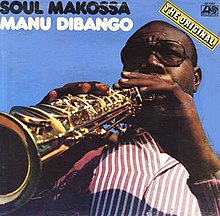"Soul Makossa"is a song by Camerooniansaxophonistand songwriterManu Dibango,released as asinglein 1972. It is the mostsampledAfrican song in history.[1]The song was originally recorded as theB-sidefor "Hymne de la 8e Coupe d'Afrique des Nations", a song celebrating theCameroon national football team's accession to the quarterfinals of theAfrica Cup of Nationsfootball tournament, as well as Cameroon's hosting the games for the first time; the lyrics were written by Cameroonian poet and musicologistS.M. Eno Belinga.Except for some words in English, it was written inDuala,a nativedialect continuumfrom Cameroon. Manu Dibango later recorded a new version for his 1994 albumWakafrika,titled "Mouvement Ewondo".[2]
| "Soul Makossa" | ||||
|---|---|---|---|---|
 | ||||
| SinglebyManu Dibango | ||||
| from the albumSoul Makossa | ||||
| A-side | "Hymne de la 8eCoupe d'Afrique des Nations"(original) | |||
| B-side | "Lily" (reissue) | |||
| Released | 1972 | |||
| Recorded | 1971 | |||
| Genre | Makossa | |||
| Length | 4:30(original non-edited version) | |||
| Label | Fiesta Records (France) Atlantic Records(US) London Records(UK/Canada) BorderBlaster (Europe) | |||
| Songwriter(s) | Manu Dibango | |||
| Manu Dibangosingles chronology | ||||
| ||||
| TV performance | ||||
| "Soul Makossa" (ORTF, 1973)on YouTube | ||||
In 1972,David Mancusofound a copy in aBrooklynWest Indian record store and often played it at his parties atThe Loft.[3]The response was so positive that the few copies of "Soul Makossa" in New York City were quickly purchased.[3]The song was subsequently played heavily byFrankie Crocker,who deejayed atWBLS,then New York's most popular black radio station.[3]Since the original release was so obscure, at least 23 groups quickly released cover versions to capitalize on the demand for the record.[3]
Later in 1972, American-basedAtlantic Recordslicensed the original Manu Dibango version from French record labelFiesta,and released it as a single (with the B-side track being "Lily" ). The single peaked at number 35 on theUSBillboardHot 100chart in 1973; Dibango's original version of the song and a cover by Afrique were on the USBillboardHot 100 chart at the same time.[3][4][2]The song also became an international hit leading to even more cover versions by various groups around the world.[2]
The song is probably best known for the chanted vocalrefrain"ma-ma-ko, ma-ma-sa, ma-ko ma-ko-sa", which was adapted and used in songs by many prominent artists such asMichael Jackson's "Wanna Be Startin' Somethin'"from his albumThriller(1982) andRihanna's hit single "Don't Stop the Music"fromGood Girl Gone Bad(2007). The refrain is a play on the wordmakossa,Dibango's main music genre.[5]
In 2011, a second version of the song titled "Soul Makossa 2.0" was recorded in France by Manu Dibango and Wayne Beckford and was issued as the first single from Dibango's album,Past Present Future.
The 2024PBSseriesDisco: Soundtrack of a Revolutionexplores the importance of "Soul Makossa" to the history of disco music.[6]
Michael Jackson/Rihanna lawsuit
editRihanna's 2007 hit single "Don't Stop the Music"uses samples fromMichael Jackson's 1982 single "Wanna Be Startin' Somethin'".In February 2009, Dibango filed a lawsuit against the two singers, claiming that he wasn't consulted in Michael Jackson's representatives giving permission to Rihanna to use" mama-say mama-sa mama-ko-sa "(a hook inspired by Dibango's" Soul Makossa ") without permission. According toAgence France-Presse,Dibango and Michael Jackson had earlier reached a financial settlement in this matter back in the days of the making of "Wanna Be Startin' Somethin'". But in 2007, when Rihanna asked Jackson for permission to sample the line, he allegedly approved the request without contacting Dibango beforehand. Dibango's attorneys brought the case before a court inParis,demanding€500,000 in damages and forSony BMG,EMIandWarner Musicto be "barred from receiving 'mama-say mama-sa'-related income until the matter is resolved".[7]However, the court in Paris rejected his motion as being illegitimate due to him successfully applying for his name being listed on Rihanna’s releases of the song a year earlier. The court in Paris ruled that with this agreement the African artist abdicated from any further claims.[8]
1973 US single
editTrack listing
edit- "Soul Makossa" – 4:30
- "Lily" – 3:02
Personnel
edit- Manu Dibango– writer, arranger, vocals, saxophone
- Georges Arvanitas– piano
- Patrice Galas – piano
- Joby Jobs – drums
- Manfred Long – bass guitar
- Freddy Mars – percussion
- Manu Rodanet – electric guitar
- Pierre Zogo – acoustic guitar
Charts
edit| Chart (1973) | Peak position |
|---|---|
| Australian (Kent Music Report)[9] | 26 |
| FranceSNEP Charts[10] | 17 |
| USBillboardHot 100[11] | 35 |
| USBillboardHot Soul Singles[12] | 21 |
References
edit- ^Durosomo, Damola (8 May 2020)."This Video Explores the Countless Songs That Sample Manu Dibango's 'Soul Makossa'".Okay Africa.Archivedfrom the original on 14 May 2020.Retrieved10 January2024.
- ^abcBroughton, Simon; Ellingham, Mark (2000).World Music: The Rough Guide.Rough Guides.p. 441.
- ^abcdeShapiro, Peter(2005).Turn the Beat Around: the Secret History of Disco.New York:Faber and Faber, Inc.p.35.
- ^Marsh, Dave(1999).The Heart of Rock and Soul: The 1001 Greatest Singles Ever Made.Da Capo Press. p. 548.
- ^Ben Zimmer(26 June 2009)."Ma ma se, ma ma sa, ma ma coo sa".Language Log.Retrieved25 June2011.
- ^"Disco: Soundtrack of a Revolution | Rock the Boat | Episode 1 | PBS".PBS.
- ^Michaels, Sean (4 February 2009)."Rihanna and Michael Jackson sued by African singer".The Guardian.Retrieved17 January2012.
- ^"Cameroon musician Manu Dibango failed with his court case against Michael Jackson and Rihanna".Deutsche Presse Agentur. 26 February 2009.
- ^Kent, David(1993).Australian Chart Book 1970–1992(illustrated ed.). St Ives, N.S.W.: Australian Chart Book. p. 88.ISBN0-646-11917-6.
- ^"Les classements des titres par artistes (lettre" D ")".InfoDisc. Archived fromthe originalon 19 May 2013.Retrieved14 September2020.
- ^"Manu Dibango Chart History: Hot 100".Billboard.Retrieved25 March2020.
- ^"Manu Dibango Chart History: Hot R&B/Hip-Hop Songs".Billboard.Retrieved25 March2020.
External links
edit- Ben Zimmer(26 June 2009)."Ma ma se, ma ma sa, ma ma coo sa".Language Log.
- Ed Hogan."Soul Makossa – Manu Dibango".Allmusic.